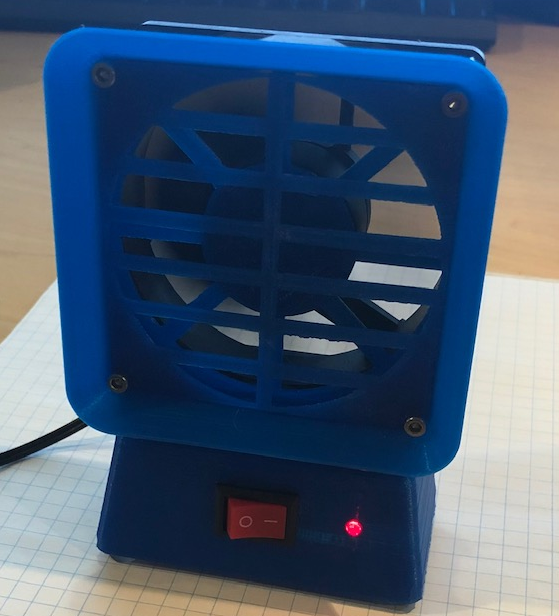I've been looking into soldering and read up on the health risks and I noticed you need a fume extractor. I was thinking about using a fan but I don't think that safe. If I solder outside will I need to purchase a fume extractor or is the natural ventilation enough, also can I do it in a garage with the garage door open?
-
\$\begingroup\$ Just try not to stand over the fumes for a long time and have vents \$\endgroup\$– D.A.S.Commented Jan 2, 2021 at 18:19
-
\$\begingroup\$ If you use a cheap soldering iron then it will not have any temperature control and will. cause unhealthy flux smoke instead of a pleasant harmless flux aroma. All my life I have used a temperature controlled soldering iron and never soldered in a tiny closed closet. \$\endgroup\$– AudioguruCommented Jan 2, 2021 at 18:50
-
\$\begingroup\$ Actually being outside should be no problem, especially if there is even the slightest of breezes. But I do not consider being at the back of in an open garage (where I assume your bench is) to be outside because there is no pass-through breeze. On really wind days you can see dust just blowing around in circles inside the garage; It doesn't actually get blown out. \$\endgroup\$– DKNguyenCommented Jan 2, 2021 at 18:50
-
\$\begingroup\$ A small (4-6 inch) fan at the very least. Don't need to point the fan directly at the work, point it just off to the side, cross flow relative to you, and it will gently draw away the smoke \$\endgroup\$– Pete WCommented Jan 2, 2021 at 19:26
-
\$\begingroup\$ This EE answer should help - it covers far more than jut solder type. What type of solder is safest for home (hobbyist) use? . Also see Which are the safety recommendations for soldering? \$\endgroup\$– Russell McMahon ♦Commented Jan 3, 2021 at 1:35
3 Answers
Whether my soldering area is fume-extracted (work) or not (home), I make it a habit to take a deep breath before starting, then breathing out gently while I make the joint. This is not a method recognised by any health and safety authority, but it works for me.
At home, by the time I breath any flux fumes, they are diluted by many orders of magnitude in the air of the room, and have cooled down.
-
4\$\begingroup\$ I do exactly the same thing :) \$\endgroup\$– brhansCommented Jan 2, 2021 at 18:54
-
\$\begingroup\$ Fume extractor is just wasted money, I solder everyday for years and don't any problems. It may be useful only if if You use some agressive flux (which You normally doesn't use) \$\endgroup\$– fifi_22Commented Jan 8, 2021 at 10:45
-
3\$\begingroup\$ @fifi_22 I knew someone who smoked 20 a day for life and died peacefully at 88. Does that mean smoking is safe? \$\endgroup\$– awjloganCommented Jan 8, 2021 at 10:58
I'm managed to get through most of my career without a solder fume extractor despite being a bit sensitive to the flux fumes. Helps that I use rosin-flux and temperature-controlled irons. So you don't actually need it for occasional soldering if you avoid breathing the flux. The smoke does perversely tend to curl up towards the operator. A fan from across the room will prevent that. A nearby fan might cool the solder joints excessively.
Soldering outside would add an additional variable to the soldering if there is a breeze and isn't terribly practical for much of the year here in Canada since gloves and/or below-zero temperatures tend to negatively affect the dexterity.
I recently (this month) threw together a 3D printed fume extractor from a salvaged 80mm 12V power supply fan and 3D printed parts (you can find similar items based on 120mm fans on Thingiverse, and mine was loosely based on those). Mine will take a 5mm activated carbon filter whenever it arrives from China. In the meantime it moves just enough air to make a difference. I used a 9V adapter to keep it quiet, for more airflow a 12V one can be substituted. Other than the $3 filter, out-of-pocket cost was zero.
-
\$\begingroup\$ "... despite being a bit sensitive to the flux fumes" I got that too. And how do you think we ended up being sensitive to them? I wasn't sensitive to them fresh out of school. \$\endgroup\$– LundinCommented Jan 8, 2021 at 10:58
-
\$\begingroup\$ @Lundin I had serious asthma as a child, so I don't think it was acquired by soldering. I don't think the flux helped. \$\endgroup\$ Commented Jan 8, 2021 at 11:04
-
1
If it's just for occasional hobbyist purposes, then you don't need it - holding your breath as advised in another post is what you'd do then. The main problem is that in order to see what you are doing, you ideally want to have your face just above the object, so the smoke tends to right up into your nostrils, regardless of how well ventilated the room is.
You should seriously be concerned about the fume if you do extensive soldering work, like when mounting a full PCB or series production. Then you need a fume extractor, period. The smoke from the vaporized flux is no laughing matter, it will give you all kinds of nasty allergies and other health problems.

